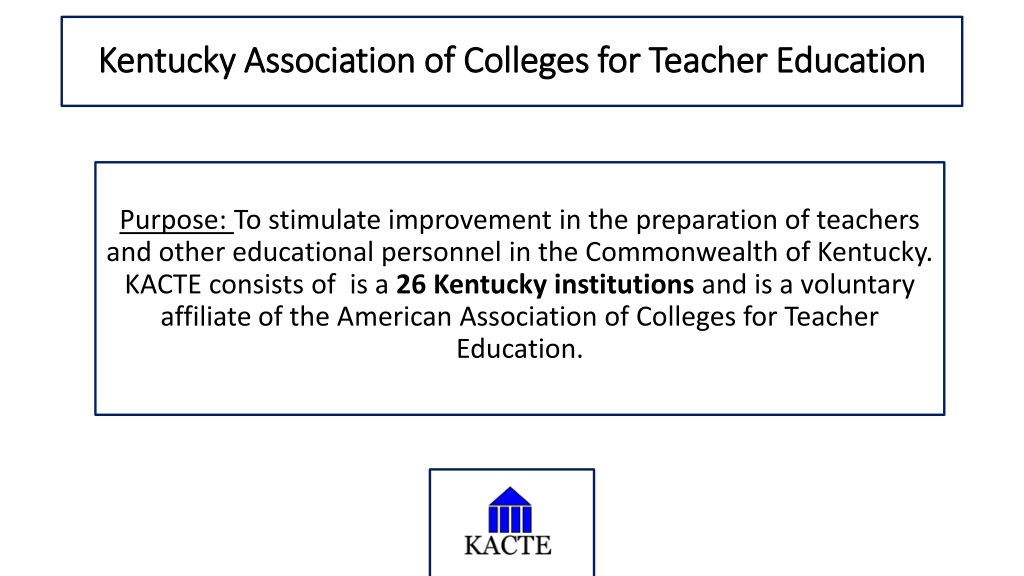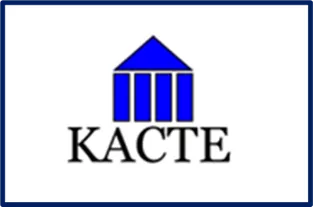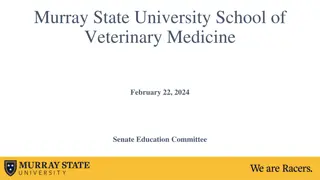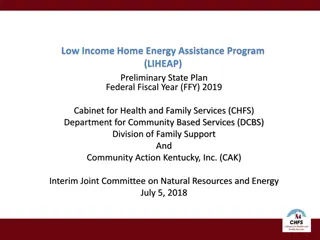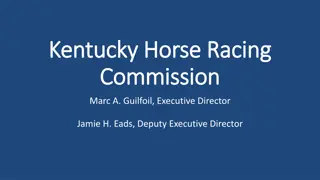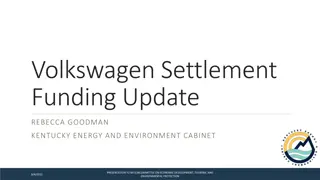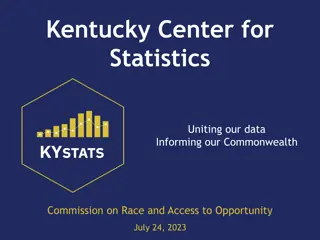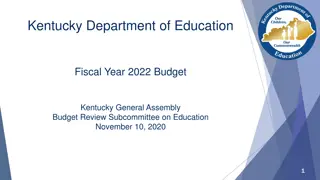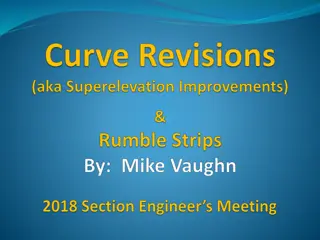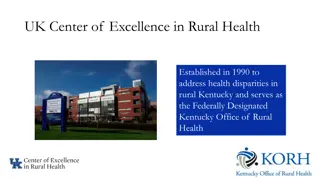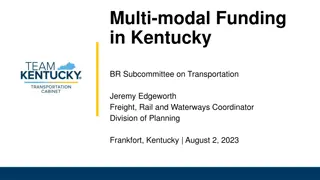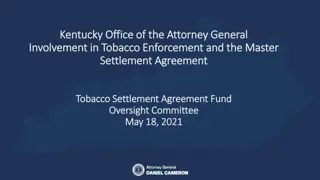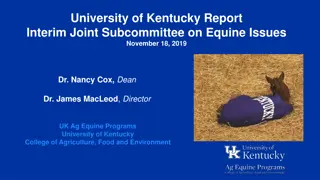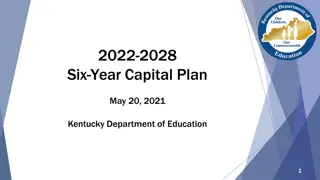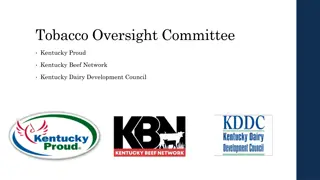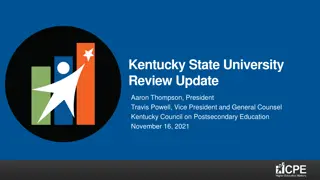Enhancing Teacher Education in Kentucky
This content focuses on the Kentucky Association of Colleges for Teacher Education (KACTE) and the common factors in teacher preparation emphasized by the organization. It highlights the Kentucky Academic Standards that prepare teachers to help students achieve literacy and mathematical proficiency. Additionally, it discusses the International Literacy Standards for candidates preparing for teaching roles, covering areas like foundational knowledge, curriculum and instruction, and assessment and evaluation.
Download Presentation

Please find below an Image/Link to download the presentation.
The content on the website is provided AS IS for your information and personal use only. It may not be sold, licensed, or shared on other websites without obtaining consent from the author.If you encounter any issues during the download, it is possible that the publisher has removed the file from their server.
You are allowed to download the files provided on this website for personal or commercial use, subject to the condition that they are used lawfully. All files are the property of their respective owners.
The content on the website is provided AS IS for your information and personal use only. It may not be sold, licensed, or shared on other websites without obtaining consent from the author.
E N D
Presentation Transcript
Kentucky Association of Colleges for Teacher Education Kentucky Association of Colleges for Teacher Education Purpose: To stimulate improvement in the preparation of teachers and other educational personnel in the Commonwealth of Kentucky. KACTE consists of is a 26 Kentucky institutions and is a voluntary affiliate of the American Association of Colleges for Teacher Education.
Common Factors in Teacher Preparation Common Factors in Teacher Preparation International Literacy Standards (teachers know & do) National Council of Mathematics Teacher Standards (teachers know & do) Kentucky Academic Standards (students to know & do) Standards Requirements Partner districts Advisory committees Office of Teaching & Learning Office of Education Licensure and Effectiveness Stakeholder input Faculty who specialize in Literacy education and Math education Active participation in research Collaboration across institutions Research base
Kentucky Academic Standards prepare teachers to help student achieve these standards Reading Foundational Skills Mathematics Print Concepts Phonological Awareness Phonics and Word Recognition Fluency Vocabulary acquisition and use Comprehension* Practices 1. Make sense of problems and persevere in solving them 2. Reason abstractly and quantitatively 3. Construct viable arguments and critique the reasoning of others 4. Model with mathematics 5. Use appropriate tools strategically 6. Attend to precision 7. Look for and make use of structure 8. Look for and express regularity in repeated reasoning *embedded into the standards and guiding principles for reading literature and informational texts (key ideas, craft & structure, Mathematical content standards are grade specific
International Literacy Standards (2017) International Literacy Standards (2017) ILA: STANDARD 1: Foundational Knowledge ILA STANDARD 2: Curriculum & Instruction ILA STANDARD 3: Assessment and Evaluation 1.1: Candidates demonstrate knowledge of major theoretical, conceptual, and evidence-based components of pre-K/primary& elementary/intermediate reading development (i.e., concepts of print, phonological awareness, phonics, word recognition, fluency, vocabulary, comprehension) and evidence-based instructional approaches that support development. 2.2: Candidates plan, modify, and implement evidence-based, developmentally appropriate, and integrated instructional approaches that develop reading processes as related to foundational skills (i.e., concepts of print, phonological awareness, phonics, word recognition, fluency), vocabulary, and comprehension for pre- K/primary & elementary/intermediated learners. 3.1: Candidate understand the purposes, strengths and limitations, reliability/validity, format, and appropriateness of various types of informal and formal assessments. 3.3: Candidates use results of various assessment measures to inform and/or modify instruction.
Education Preparation Examples Education Preparation Examples - - Literacy Literacy Western Kentucky University Bellarmine University Literacy Theme Across Curriculum Big 5 in Reading Scope & Sequence of Acquisition Alignment with Districts 6 evidence-based curriculum programs LTRS Training Literacy Clinic at WKU Tier III Instruction in Local Schools MAE Literacy Leadership and Coaching Multiple methods courses Syllabi, texts, assignments w/ Big 5 focus Clinical placement: reading lesson (Standards-based instructional plan) Case Study work (assessment, analysis, next instructional steps) Phonological awareness screening test (PAST), Phonics screeners, Multi- dimensional Fluency Assessment, Curricular Based Measures, etc.
National Council of Teachers of Mathematics National Council of Teachers of Mathematics Standards for Preparing Middle & Secondary Teachers Standards for Mathematical Content & Processes Standard 1: Knowing and understanding meaningful mathematics Standard 2: Knowing and using mathematical processes Standard 3: Knowing students and planning for mathematical learning Standard 4: Teaching meaningful mathematics Standard 5: Assessing impact on student learning Standard 6: Social and professional context of mathematics teaching and learning Standard 7: Middle level field experiences and clinical practice Content Number & operations Algebra Geometry Measurement Data analysis & probability Process Problem solving Reasoning & proof Communication Connections Representation
Education Preparation Examples Education Preparation Examples - - Mathematics Mathematics Bellarmine University Western Kentucky University Grounded in Conceptual Knowledge Multiple Courses Beyond Cert Req. Courses in Mathematical Pedagogy Reducing Anxiety in Mathematics Elementary Mathematics Endorsement SKyTeach Program Specialized Praxis Tutoring Add-on Certification Options Research Methods in Math & Sc Ed Internships at Community Based EEOs Methods course & content courses Syllabi, texts, assignments w/standard- based focus Clinical placement: math lesson (Standards-based instructional plan) Task Analysis Work conceptual understanding through exploration Quantitative & abstract reasoning use of appropriate tools modeling with real-world mathematics Attention to precision of language & symbols persevere in problem solving & develop confidence
Stakeholder Collaborations Stakeholder Collaborations Partner districts / Instructional Context: clinical experiences, cooperating & mentor teachers, grade-level/content teacher needs, curricular resources, formalized partnerships to build capacity with in-service teachers Advisory Committees / Continuous Improvement school/district needs, program changes revisions and innovations, quality assurance data Office of Teaching & Learning Annual KAS update, LETRS training (8 EPPs in cohort 1 & 12 in cohort 2) Office of Educator Licensure & Effectiveness Literacy work group (17 EPPs) & developing Math work group
